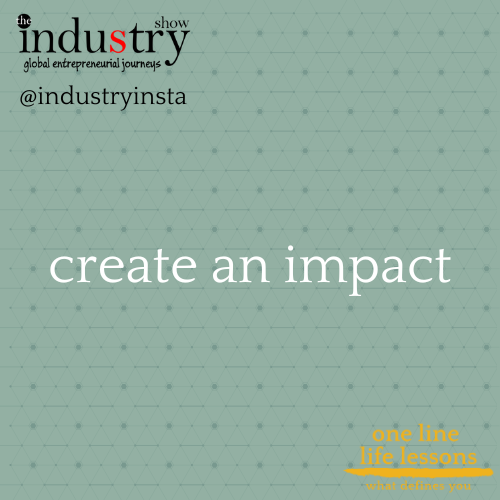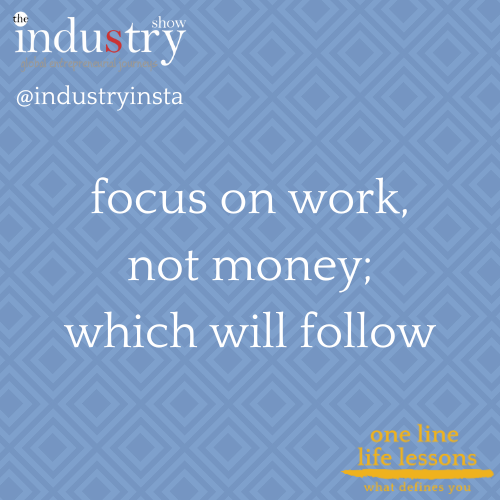Sep 2, 2023
Vish Madhugiri
Vishwanath Madhugiri is the Chief Strategist at Saaz Micro Inc. – leaders in advanced image sensor product R&D for space, airborne & specialty imaging. Previously, he was the Chief Innovation Officer at Lycamobile India – world’s largest Mobile Virtual Network Operator. He also held senior leadership positions at Infosys and Tata Group. Vishwanath is recognized for public service by Her Majesty Queen Elizabeth.
Vishwanath is a seasoned professional with a background in business development, sales, and management consulting. With over a decade of experience, Vishwanath has worked with various organizations, driving growth and implementing strategic initiatives. He is skilled in building and nurturing client relationships, identifying business opportunities, and delivering innovative solutions. Vishwanath is also passionate about mentoring and developing talent, contributing to the professional growth of his teams.
One Line Life Lessons from Vish





Episode Highlights
- Vishwanath Madhugiri introduces himself as a business and technology professional with global exposure. (0:02 – 1:18)
- He describes SARS as a design company specializing in electro-optical infrared imaging sensors for space, aerospace, and defense applications. (2:09 – 3:22)
- Vishwanath discusses the excitement and impact of their work, including projects like the James Webb Space Telescope, which enables viewing of the early universe. (3:23 – 6:41)
- Challenges include pushing technological boundaries and overcoming failures, but he emphasizes the importance of persistence and team effort. (7:08 – 10:26)
- Exciting future projects include a successor to the James Webb Telescope and national security projects. (10:42 – 12:26)
- For relaxation, Vishwanath enjoys walking his dog and reading books on current affairs and strategic issues. (16:44 – 18:00)
- He shares several one-line life lessons, including the value of authenticity, continuous improvement, focusing on the work rather than monetary success, and creating lasting impact. (18:39 – 22:28)
- Vishwanath expresses gratitude for the opportunity to share his journey and insights. (24:08 – 24:36)
Show Transcript
Transcript - Full Episode
[Nitin Bajaj] (0:02 – 0:11)
Hey everyone, welcome to The Industry Show. I’m your host Nitin Bajaj and joining me today is Vishwanath Madhugiri. Vish, welcome on the show.
[Vishwanath Madhugiri] (0:13 – 0:17)
So nice to be here. Thank you so much, Nitin. It’s a pleasure to be on the show.
[Nitin Bajaj] (0:18 – 0:22)
Pleasure is all ours. Let’s start with the big question. Who is Vish?
[Vishwanath Madhugiri] (0:24 – 1:18)
Well, that’s a very profound question and it’s great that you’ve asked me that because it’s almost like an existential question, isn’t it? Who is Vish? I’ve been grappling with this for some time. I think if I were to sum it up, I would say that I am a business professional, a technology professional. I’m a person with multiple industry exposure, multiple continent exposure. But at the end of the day, with all of those experiences, I’m also a seeker. I’m always seeking something in life and you can call me a polyglot as well. So in some substance, somebody who’s seeking something all the time, a lifelong learner, hopefully.
[Nitin Bajaj] (1:22 – 2:08)
I think that energy, that quest, that curiosity is what keeps us not just alive, but humming and thriving. So I love that spirit and hear that from someone who’s literally been around the world, has seen it all, done it all, and has brought many different perspectives and experiences together. It’s amazing to hear that that spirit is alive and well. So tell us about what your current profession and obsession is. Tell us about SARS, what’s the mission, the vision, and the size and scale of the operations.
[Vishwanath Madhugiri] (2:09 – 3:22)
Sure. First of all, thank you so much for you. You yourself have been around the world and you are a person who’s doing a great amount of service. You are actually bringing on professionals who can act as some kind of inspiration to the younger generation. So that’s, I salute that, that kind of work. As far as what we do, SARS, we are a design company and what we do is we design very specialized electro-optical infrared imaging sensors for space, aerospace, and defense applications. And what that means is that these imaging sensors are able to enable cameras to see in very low light conditions, and then they can be placed on satellites and various other platforms in order to do earth observation or in order to source for any other minerals and deposits, as well as for surveillance and other operations. So the applications are widespread and it’s a very exciting field to be in.
[Nitin Bajaj] (3:23 – 4:10)
I can imagine you’re literally building rockets, but not just that, you’re giving eyes to them, to the satellites, to all of these really cool cutting edge technology that you’re able to get in really early into the process and partner with the best of the best in the world and bring these things to life. So super exciting stuff. I typically ask people why they do what they do.
And as much as I know, it’s this excitement, this exposure to this technology, I still want to ask you that question. And I would also love to hear from you the impact of this work.
[Vishwanath Madhugiri] (4:10 – 6:07)
Oh, absolutely. I mean, that’s such a profound question, because, you know, the fact that we are able to work as an organization, it has taken us quite a few years as a small company to get up to speed and compete with the big boys, so to speak. But at the end of the day, although the barrier to entry is very high, we are now able to do a lot of the cutting edge stuff that very advanced companies do. And what makes this field so exciting is that it is something, you know, which has a vast area of applications. And there is no end to it. I mean, it could be as simple as autonomous cars, LiDAR application. Or it could be, you know, a medical application where you’re doing invasive surgery, where you have an imaging sensor. And that is helping in the surgery or in the operation. So and also, it could be a satellite, or deep space applications. For example, a few of our sensors are on the James Webb Space Telescope, which enables, you know, light to be seen from 13.45 billion years ago, you’re looking back in time. And we have a midwave infrared sensor that is able to do that. And we also work with NASA, and, you know, astronomy applications as well. So as you said, this is pretty exciting stuff, it enables the universe to unfold, so to speak, in front of our eyes, and to look back in time, and to see how the early universe existed in its formative years. And it’s incredible to even think that these imaging sensors can make this possible.
[Nitin Bajaj] (6:08 – 6:41)
So true. And, you know, I remember our previous conversations where we specifically talked about the images coming out of the James Webb, and to be a part of making that history happen. Yes, bring that to life and to allow us as a community as humanity, to be able to see the seeds of how life comes around. Yeah, what’s happening, not just around us, but literally in the universe is so fascinating.
[Vishwanath Madhugiri] (6:41 – 7:07)
Absolutely, absolutely. I mean, it, you know, I sometimes feel this is what keeps me young, so to speak, because it’s the constant, you know, quest for things. And I think if you look back, in retrospect, as humanity, had there not been people who always sought, then we would never have pushed the boundaries of science and technology and knowledge. So I think it’s very interesting. Yes.
[Nitin Bajaj] (7:08 – 7:30)
Well, thank you for what you do. And, you know, this, a lot of this, as you’re defining the cutting edge of technology of what, what is the art of the possible, right? This is not easy work. So I’m intrigued to ask you, what’s amongst these many challenges? What’s the one big challenge you face?
[Vishwanath Madhugiri] (7:32 – 9:18)
So I think I would say the answer would be two or threefold. On the one hand, the challenge for doing such cutting edge work is to push the technological boundaries, and that requires investment. So that is one challenge, you know, how do we seek the funding? How do we bootstrap ourselves? And how do we, how are we able to compete to be able to get the financial funding to be able to do these things. So that is one aspect of it. The other aspect is what I would call as the technology itself. So what we are actually doing is we are trying to crack the hard problems. And the hard problems are, you know, are always challenging.
And there are many, so called, what I would call a so called failures that come in the way, because I regard failures, as, you know, stepping stones to success as learning experiences, I don’t really regard them as failures. But definitely, it can phase a few people, it can cause them to be, you know, dejected or depressed. And it requires a lot of willpower and a lot of nerves of steel to be able to push on. So I would say that when you try and solve hard problems, you are pushing the boundaries, and you’re bound to have failures. But, you know, challenges is not in giving up. But I must say that I’m only a very small cog in the wheel, that we have a team of fantastic technologists with us, who are equally excited and equally, you know, determined to push the boundaries.
[Nitin Bajaj] (9:20 – 10:26)
I’m not surprised one bit. That said, you know, it’s the leadership, it’s the vision, it’s the strategy that we need to put together, especially when you’re dealing with a lot of these unknowns, right? It’s essentially your domain, that the next step could be anything. And you may have to restart, right? The work you put in for months, or maybe even years, ends up in a dead stop, and you have to go back and start again. So keeping the team energized, motivated, and to continue to have a vision and have that clarity is extremely important. So I love your humility. But at the same time, I know the deep challenges you face and to be able to concise them into threefold deliverable is easier said than done. Thank you. Yeah, kudos to the effort to you and the entire team at SAS for making these strides in breakthrough technology. Thank you.
[Vishwanath Madhugiri] (10:26 – 10:28)
We’d like to keep ourselves grounded.
[Nitin Bajaj] (10:30 – 10:39)
I’m sure. You know, on the flip side of challenges come opportunities, and I’m curious to hear the most exciting one that is ahead of you.
[Vishwanath Madhugiri] (10:42 – 12:11)
Well, that’s very interesting. I mean, when we talk about, so the most exciting thing, I think one of the most exciting things that we are working on is a successor to the James Webb Space Telescope. And that is, you know, these projects are multi-year projects, and they are planned years in advance. So while we will see the fruits of our labor, maybe many, many years down the line, but we have already started working on that. The other thing, of course, is that, you know, the security of any country is extremely important. And working on national security projects is something which is extremely important, and it protects the country. So these are also technologies that push the boundaries. And in terms of astronomy applications, in terms of applications for NASA, there are always some exciting project or the other, which, you know, is aspirational. And that enables us to sort of keep our, you know, mind agile and young, and keeping up, trying to solve new challenges all the time. So it’s like, you know, a sequence of projects or a sequence of challenges that we like to tackle. So.
[Nitin Bajaj] (12:12 – 12:26)
Love how you created a challenge out of an opportunity. So the opportunity is to come up with and deal with these challenges in a positive way. I love that. Absolutely.
[Vishwanath Madhugiri] (12:27 – 12:47)
I mean, the trick is, sometimes I feel the trick is to keep your mind nimble and agile. And we attitude, your attitude flexible, so as to be able to deal with any contingency or any challenge that is thrown at you. And, you know, you know, this better than anybody, you know, having an open mind always helps.
[Nitin Bajaj] (12:48 – 13:17)
So true. Wish I would love to take a pause a moment and look back in the rear view mirror in your career, in your personal life, and ask you to share two instances, one in which there was success beyond your imagination. And another one in which things did not work out as you had expected. It became, it was a failure and it became a lesson.
[Vishwanath Madhugiri] (13:20 – 15:15)
Yeah, well, you know, sometimes, well, it’s interesting. In fact, that I define success as doing a job to the best of your ability, and then forgetting about it. Yes. Because I feel that when you have done your job to the best of your ability, it will come around to you in some point in time in some good form. But having said that, I mean, in the conventional way that success is defined, there are instances where you have done your very best, but you may not have achieved the desired results. So when we were working on the James Webb Space Telescope, there were many occasions because it was a seven to eight year project. And there were many occasions when there were delays in the project when it was almost as if the telescope would never be launched. So there were many occasions when we felt like giving up. And, you know, the funding was not there, in many instances, or during long periods of time. That could well have been a situation where we could have given up. But we persisted. And there have also been instances where a project has started, but the funding has stopped. But we have continued to fund it through our own funds, in the hope that it will get restored at some point. And it has happened in a few cases, and it hasn’t happened in a few cases. But even though the funding may have stopped, the fact that we continue to invest in that particular technology, we know will eventually pay us off in some other project. So I think that would be one example of, you know, not so success, or what, you know, you would call as a, as a, you know, medium term success.
[Nitin Bajaj] (15:16 – 15:20)
I love the extremely long term approach.
[Vishwanath Madhugiri] (15:20 – 15:21)
Yes.
[Nitin Bajaj] (15:22 – 16:40)
You take in general, but also in these specific moments. And as a, as you said, with a team with limited resources, it can be extremely challenging to be able to take that long term view, to have that faith, that things will turn around, and maybe they won’t. So to be open to continuing to invest in the longer term, and not caring about the short term is, is unheard of.
So that’s, that’s really amazing to hear. And especially in the spaces you work in, you know, which could be in defense, which could be in the interest of national governments. It’s amazing to have that kind of view amazing to have people like you, and the team, because that’s what moves us as a community forward. So thanks again for having that perspective. Because it’s not very common to do that. Thank you. I would love to switch gears and hear about what do you do for fun to disconnect to reset, and come back with all your positive energy to tackling some of these world’s biggest challenges?
[Vishwanath Madhugiri] (16:44 – 18:00)
Well, you know, one thing is I like to take my dog out for a walk to de-stress. That’s one of the best ways, and he’s very demanding. So I have to take him out. In terms of de-stressing, when I was younger, I used to love to read books. You know, I used to read a lot of books, I don’t read as much. But I now read them strategically, you know, I’m very much interested in current affairs, interested in think tanks. I’m interested in, you know, foreign policy issues, strategic issues. And I’m currently reading a book called Grasping Greatness, which is about how India can aspire to be a great power. So it’s a book edited by three of my favorite authors, you know, Ashley Tellis, Dr. Vivek Debroy, whom you know very well, and C. Raja Mohan. So, you know, so these are all great people, and they have recently come out of this book. When we meet up, you know, we can exchange notes on that. But it’s, I’m beginning to read that.
[Nitin Bajaj] (18:01 – 18:38)
I love that. And I do think this is not India’s decade, or India’s 20 years. It’s India’s century and millennium. So, yeah, super excited to hear your thoughts on that. And with that, I would love to move us into my favorite part of the show. We call it the one line life lessons.
These are not quotes, but philosophies that you have either come up with, or come to and I would love to hear your one line life lessons. Thank you.
[Vishwanath Madhugiri] (18:39 – 22:28)
Well, I have lived by a few, you know, sort of dictum, so to speak, maybe not consciously, but unconsciously, and I will try and frame it in words. One is, be authentic, be genuine, be authentic. What you see is what you get with me. Sometimes, you know, I may come across as very direct, or, you know, blunt, even blunt. But, well, then you see the whole picture, you know, there’s nothing hidden. So that way, I feel it’s much better to relate to people, because we can then engage at a very authentic, real level and real conversations, and serious conversations can happen. So that’s one thing. The second thing is, long ago, I read that, the saying that we are what we repeatedly do. Excellence, then is not an act, but a habit. So I think people always talk about what is excellence, you know, it’s such so aspirational. But according to me, it’s just doing a thing repeatedly, till you, you know, become very good at it. And this saying was originally attributed to Aristotle. But then, I think it was refined by another American, great American author. But this, essentially, this is what it means. That, you know, just get better and better at things as you repeatedly do them. Also, I have been inspired by Mr. Narayan Murthy of Infosys, some of his sayings like a good night’s sleep is worth a billion dollars. So, you know, if you’ve done your job, and you’re tired, you will get a good night’s sleep. If there’s something playing with your conscience, you won’t get sleep. So that is one of the things. And I have always also thought that, you know, monetary success and intellectual success are two different things. I have never measured success in terms of monetary aspects. It’s just doing something to the best of your ability. And then, as I said, forgetting about it, because I consciously feel that this creates a virtual cycle. And ultimately, the good things come back to you in a good form. And money that comes in is a consequence of the inputs and the hard work that you put in, it will come in some form automatically. But the focus should not be on the money, it should be on the work. And maybe, you know, leaving something which is lasting, because, you know, people are not really going to remember a person by the money he or she leaves, they’re really going to remember the person by whatever little contributions, or lasting impressions, or legacy that they left. It could be a very small thing, it could be, you know, something which is impactful. And yes, I do believe in creating impact, because, you know, life is short. And I think we should be able to create an impact, like the kind of work that you are doing creates a lot of impact. And to be able to do this, if I’m not mistaken, in eight consecutive sessions, in eight consecutive years, consistently, is precisely my definition of excellence that you have done.
[Nitin Bajaj] (22:30 – 24:08)
Thank you, really appreciate the words. And coming from you, it really means a lot. You know, I do agree, it’s a lot about discipline. It’s, it has everything to do with doing your best, putting in your effort. And as our manuscripts have taught us, we only control the effort, not the outcomes. And to stay aligned to that to stay true and humble to our effort and our work that we put in, and not get fixated by what comes out on the other side, whether it’s money, whether it’s, you know, vested interest is difficult, but that’s where the journey begins. Absolutely. To have, you know, people who have acquired that wisdom, such as yourselves, to come and share that with the next generation, and the generation after that, is how we uplift ourselves, our community, to do more to do better, and to create true equity, and true inclusion, you know, outside of those norms that get talked about in the corporate world. Absolutely. Vish, I truly appreciate you making the time to be with us today to share your journey, your story, your life lessons, and most importantly, for doing what you do in advancing humanity, and challenging every single day, what technology is able to do what we, as humans are able to do.
[Vishwanath Madhugiri] (24:08 – 24:36)
So thank you. You’re most welcome. And as you rightly said, every generation is smarter than the previous one. And all we can do is to guide them, and be there for them, when necessary, and when they are seeking. And whatever we can pass on, I think that would be our lasting legacy. Awesome.
[Nitin Bajaj]: Thank you so much, Vish.
[Vishwanath Madhugiri]: You’re most welcome.
Thank you so much for having me.
[Nitin Bajaj]: Thank you.



